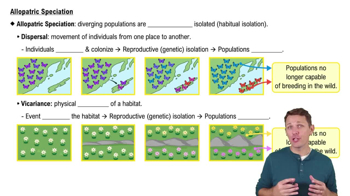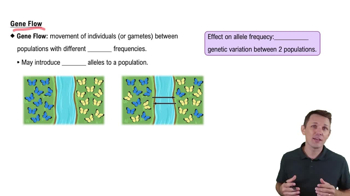Males of different species of the fruit fly Drosophila that live in the same parts of the Hawaiian Islands have different elaborate courtship rituals. These rituals involve fighting other males and making stylized movements that attract females. What type of reproductive isolation does this represent? a. habitat isolation b. temporal isolation c. behavioral isolation d. gametic isolation
Which of the following factors would not contribute to allopatric speciation? a. The separated population is small, and genetic drift occurs. b. The isolated population is exposed to different selection pressures than the ancestral population. c. Different mutations begin to distinguish the gene pools of the separated populations. d. Gene flow between the two populations is extensive.
 Verified step by step guidance
Verified step by step guidance
Verified Solution
Key Concepts
Allopatric Speciation

Genetic Drift

Gene Flow

According to the punctuated equilibria model, a. given enough time, most existing species will branch gradually into new species. b. most new species accumulate their unique features relatively rapidly as they come into existence, then change little for the rest of their duration as a species. c. most evolution occurs in sympatric populations. d. speciation is usually due to a single mutation.
Bird guides once listed the myrtle warbler and Audubon's warbler as distinct species. Recently, these birds have been classified as eastern and western forms of a single species, the yellow-rumped warbler. Which of the following pieces of evidence, if true, would be cause for this reclassification? a. The two forms interbreed often in nature, and their offspring survive and reproduce well. b. The two forms live in similar habitats and have similar food requirements. c. The two forms have many genes in common. d. The two forms are very similar in appearance.
Plant species A has a diploid chromosome number of 12. Plant species B has a diploid number of 16. A new species, C, arises as an allopolyploid from A and B. The diploid number for species C would probably be a. 14. b. 16. c. 28. d. 56.
